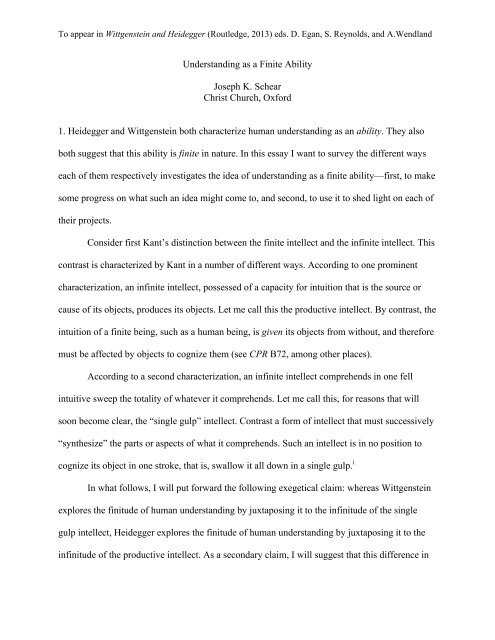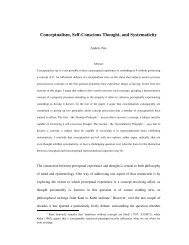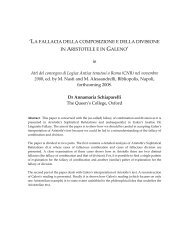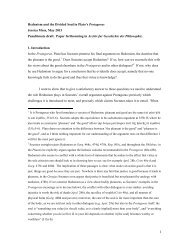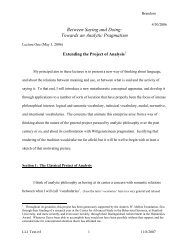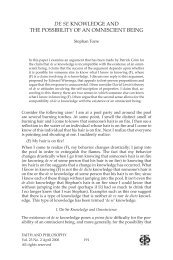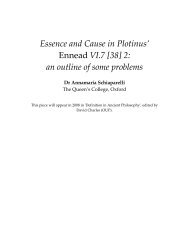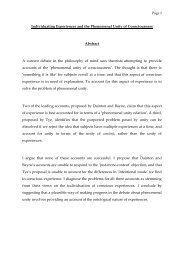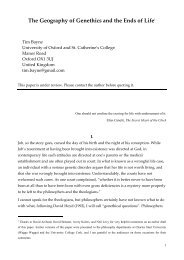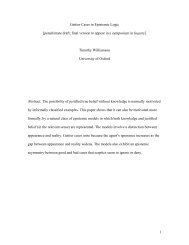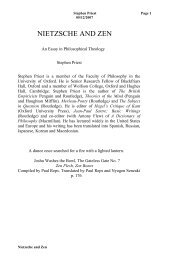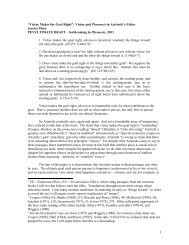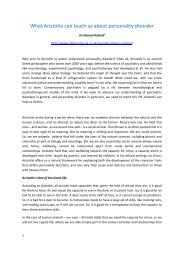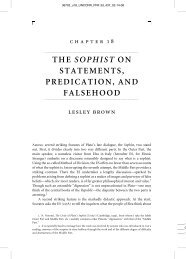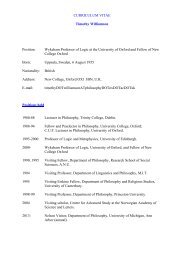Understanding as a Finite Ability Joseph K. Schear Christ Church ...
Understanding as a Finite Ability Joseph K. Schear Christ Church ...
Understanding as a Finite Ability Joseph K. Schear Christ Church ...
Create successful ePaper yourself
Turn your PDF publications into a flip-book with our unique Google optimized e-Paper software.
To appear in Wittgenstein and Heidegger (Routledge, 2013) eds. D. Egan, S. Reynolds, and A.Wendland<br />
<strong>Understanding</strong> <strong>as</strong> a <strong>Finite</strong> <strong>Ability</strong><br />
<strong>Joseph</strong> K. <strong>Schear</strong><br />
<strong>Christ</strong> <strong>Church</strong>, Oxford<br />
1. Heidegger and Wittgenstein both characterize human understanding <strong>as</strong> an ability. They also<br />
both suggest that this ability is finite in nature. In this essay I want to survey the different ways<br />
each of them respectively investigates the idea of understanding <strong>as</strong> a finite ability—first, to make<br />
some progress on what such an idea might come to, and second, to use it to shed light on each of<br />
their projects.<br />
Consider first Kant’s distinction between the finite intellect and the infinite intellect. This<br />
contr<strong>as</strong>t is characterized by Kant in a number of different ways. According to one prominent<br />
characterization, an infinite intellect, possessed of a capacity for intuition that is the source or<br />
cause of its objects, produces its objects. Let me call this the productive intellect. By contr<strong>as</strong>t, the<br />
intuition of a finite being, such <strong>as</strong> a human being, is given its objects from without, and therefore<br />
must be affected by objects to cognize them (see CPR B72, among other places).<br />
According to a second characterization, an infinite intellect comprehends in one fell<br />
intuitive sweep the totality of whatever it comprehends. Let me call this, for re<strong>as</strong>ons that will<br />
soon become clear, the “single gulp” intellect. Contr<strong>as</strong>t a form of intellect that must successively<br />
“synthesize” the parts or <strong>as</strong>pects of what it comprehends. Such an intellect is in no position to<br />
cognize its object in one stroke, that is, swallow it all down in a single gulp. i<br />
In what follows, I will put forward the following exegetical claim: where<strong>as</strong> Wittgenstein<br />
explores the finitude of human understanding by juxtaposing it to the infinitude of the single<br />
gulp intellect, Heidegger explores the finitude of human understanding by juxtaposing it to the<br />
infinitude of the productive intellect. As a secondary claim, I will suggest that this difference in
To appear in Wittgenstein and Heidegger (Routledge, 2013) eds. D. Egan, S. Reynolds, and A.Wendland<br />
senses of finitude is coupled with a difference in the sense in which both are respectively anti-<br />
Cartesian philosophers. Where<strong>as</strong> Wittgenstein’s primary Cartesian target is a thesis in<br />
philosophical psychology—namely, that understanding consists in a mental state—Heidegger’s<br />
primary target is a Cartesian thesis in ontology—namely, that the subject of understanding is a<br />
special kind of thing. I begin with Wittgenstein, and then turn to Heidegger.<br />
2. At PI §150, Wittgenstein explicitly introduces the idea of linguistic understanding <strong>as</strong> a kind of<br />
ability, set in contr<strong>as</strong>t to the idea of understanding <strong>as</strong> a mental state , or a state of consciousness.<br />
Consider an ordinary English word, “chair.” “Are there enough chairs for everyone?” “This chair<br />
is good enough.” You’ve just read three sentences (now four) containing the word “chair.”<br />
Would you call your understanding of this word a “mental state”? If so, did you just enjoy four<br />
mental states? How long did each state l<strong>as</strong>t? As long <strong>as</strong> it took for the word to be uttered? Or did<br />
the mental state, like an echo, carry on but fade <strong>as</strong> the relevant sentence concluded? Can we<br />
determine the duration of each state by means of a stopwatch?<br />
Wittgenstein writes at PI p. 65:<br />
“<strong>Understanding</strong> a word”: a state. But a mental state?—We call dejection, excitement, pain,<br />
mental states. Carry out a grammatical investigation <strong>as</strong> follows: we say<br />
“He felt dejected the whole day”<br />
“He w<strong>as</strong> in great excitement the whole day”<br />
“He h<strong>as</strong> been in pain uninterruptedly since yesterday.”—<br />
We also say, “Since yesterday I have understood this word.” “Uninterruptedly,” though?
To appear in Wittgenstein and Heidegger (Routledge, 2013) eds. D. Egan, S. Reynolds, and A.Wendland<br />
The question that concludes the p<strong>as</strong>sage is supposed to sound confused. One could read it <strong>as</strong><br />
marking the conclusion of a reductio of the thought that understanding is a mental state, at le<strong>as</strong>t<br />
in the sense of a mental state that is a conscious experience that takes time, that h<strong>as</strong> genuine<br />
duration. At PI §154 we are instructed, “[D]on’t think of understanding <strong>as</strong> a ‘mental process.’”<br />
Call Cartesianism in the theory of understanding the claim that understanding is a conscious<br />
mental state or process.<br />
Compare the sense of confusion of “uninterruptedly, though?” with the strangeness of the<br />
question “when do you understand the word ‘chair’?” And then note the kinship of this seeming<br />
confusion with the following when-question. Wittgenstein:<br />
What if one <strong>as</strong>ked: When can you play chess? All the time? Or just while you are making a<br />
move? And the whole of chess during each move?—And how odd that being able to play chess<br />
should take such a short time, and a game so much longer!” (PI p. 65)<br />
Wittgenstein’s alternative to Cartesianism, promising to avoid such queer consequences, is the<br />
suggestion that the grammar of “understands” is closely related to that of “can” or “is able to” or<br />
“know how to” (PI §150 and §182). The respective grammars of this series of words and phr<strong>as</strong>es<br />
“belong in one investigation.” Or in PG 47: “‘<strong>Understanding</strong> a word’ may mean: knowing how it<br />
is used; being able to apply it.”<br />
3. A natural worry to have about the idea of understanding <strong>as</strong> an ability is the phenomenon of<br />
sudden understanding, <strong>as</strong> in: “Now I understand!”? Recall the “since yesterday I have understood<br />
this word” in the first p<strong>as</strong>sage above. At PI §151 Wittgenstein considers this use of
To appear in Wittgenstein and Heidegger (Routledge, 2013) eds. D. Egan, S. Reynolds, and A.Wendland<br />
“understand,” which serves <strong>as</strong> an entrée to the following illustrative scenario. A writes down a<br />
number series, and B, in the pupil position, is to figure out the formula that expresses the law of<br />
the sequence of numbers: “Now I understand!” and B proceeds to continue the series on his own.<br />
Surely here, if anywhere, understanding is a mental state—for example, the formula itself might<br />
very well occur to one, prompting the claim to understand. The familiar sense of understanding<br />
here imagined is something that happens, a moment of occurrent awareness, and so well<br />
captured by Cartesianism about understanding.<br />
One might accommodate sudden understanding by conceding that the word<br />
“understanding” is ambiguous. Sometimes we use it in the ability sense; sometimes we use it in<br />
the state sense. Compare the word “bank.” Sometimes we use it to refer to a pile of dirt by a<br />
river; sometimes we use it to refer to an institution that holds money and charges fees (among<br />
other things). But that can’t be right. To lift a remark Wittgenstein offers in a different context:<br />
“Then h<strong>as</strong> ‘understanding’ two different meanings here? — I would rather say that these kinds of<br />
use of ‘understanding’ make up its meaning, make up my concept of understanding. For I want<br />
to apply the word ‘understanding’ to all this” (PI §532). Suppose I hold up a picture of a pile of<br />
dirt by a river, and a picture of a branch of HSBC. You wouldn’t want to apply “bank” to all this,<br />
at le<strong>as</strong>t in the same sense that you want to apply “understanding” to the state of sudden<br />
understanding and the ability to understand.<br />
So how do the two uses of “understanding” go to “make up” one concept? The broadly<br />
Cartesian way to proceed here would be to start with understanding <strong>as</strong> an act or state of occurrent<br />
awareness. This is the fundamental use. And then the question is: how can we get from this to<br />
something with the shape of an ability? What glue holds together those four states of your<br />
understanding of the word “chair” so they can be seen to be something like actualizations of one
To appear in Wittgenstein and Heidegger (Routledge, 2013) eds. D. Egan, S. Reynolds, and A.Wendland<br />
fertile capacity, that is, your understanding of the word “chair”? An answer: the mental states are<br />
modifications of a single substance.<br />
Wittgenstein’s alternative to Cartesianism, at le<strong>as</strong>t on one reading, inverts the order of<br />
proceeding. This reading starts with understanding construed <strong>as</strong> an ability. That is the<br />
fundamental use of the word “understanding,” expressive of the b<strong>as</strong>ic category in terms of which<br />
the concept of understanding finds its home. One then accommodates sudden understanding by<br />
construing it <strong>as</strong> the onset of an ability. “Now I can go on!” is one expression of this onset (among<br />
others). Does the formula have to come before B’s mind for something like that expression to<br />
come out? We can e<strong>as</strong>ily imagine nothing whatsoever occurring in the pupil’s mind when he<br />
says he can go on: he just finds himself able to go on, perhaps with a feeling of relief, a rele<strong>as</strong>ing<br />
of his breath, an unhesitating stroke of his pencil, <strong>as</strong> he struggles to hold back a smile. If the<br />
formula does occur in his mind, does that suffice for him to be able to go on? We can e<strong>as</strong>ily<br />
imagine a c<strong>as</strong>e of the formula occurring without being able to go on. And it is not hard to<br />
imagine, further, the shrillness of the inspired type whose insistent reports of “Now I can go on!”<br />
make no connection with actually being able to go on.<br />
Wittgenstein accordingly says at PI §180 that “[i]t would be quite misleading . . . to call<br />
the words [‘Now I know how to go on’] a ‘description of a mental state.’” We are encouraged, <strong>as</strong><br />
an alternative, to call the expression of those words a “signal” and to judge whether the signal<br />
w<strong>as</strong> rightly employed by what the pupil goes on to do. With the c<strong>as</strong>e of sudden understanding so<br />
accommodated, <strong>as</strong> signaling the onset of an ability, its support for the truth of the claim that<br />
understanding is a mental state is disarmed. An occurrence of the formula (or what have you)<br />
coming “before the mind” is accordingly put in its place <strong>as</strong>, if not a piece of ornamentation, at
To appear in Wittgenstein and Heidegger (Routledge, 2013) eds. D. Egan, S. Reynolds, and A.Wendland<br />
le<strong>as</strong>t not integral to understanding <strong>as</strong> such. <strong>Understanding</strong>, Wittgenstein teaches us, is not a<br />
mental state. ii<br />
On a second reading, Wittgenstein’s alternative to Cartesianism does not deny that<br />
understanding is, or at le<strong>as</strong>t can be, a mental state. His remarks on understanding rather amount<br />
to the effort to disabuse us of a mythical conception of mental states. The real problem with the<br />
Cartesian construal, according to this reading, is that the mental state of understanding is pictured<br />
in complete abstraction from its surroundings—for example, the stage-setting of B having<br />
learned algebra, having used such formulae before, and so on (PI §179). It is only in the context<br />
of this cropped picture that the problem arises of how to get a self-contained state to open up into<br />
the fertile ability to go on. However, if we acknowledge the occurrence of a state of<br />
consciousness in which the formula comes before the mind, but we do so in a way which<br />
recognizes its place in a wider context, then we can recover an innocent idea of understanding <strong>as</strong><br />
a determinate mental state. Indeed, the occurrence of the formula, when it does occur, can suffice<br />
to be able to go on. “Now I can go on,” in such a c<strong>as</strong>e, is an expressive signal, but also, at one<br />
and the same time, the self-<strong>as</strong>cription of a determinate mental state. On this reading, if we call<br />
the idea of understanding <strong>as</strong> a mental state a fly, Wittgenstein is letting the fly out of the flybottle.<br />
iii While the second reading may enjoy stronger textual support, it is not clear how much<br />
ultimately hangs on the difference between them. Either way, whether “Now I can go on” is best<br />
understood <strong>as</strong> merely signaling the onset of an ability, or rather, in doing that, expressing (at<br />
le<strong>as</strong>t sometimes) the self-<strong>as</strong>cription of a determinate mental state within the wider context of the<br />
flowering of an ability, the very fact that the text makes both readings available testifies to
To appear in Wittgenstein and Heidegger (Routledge, 2013) eds. D. Egan, S. Reynolds, and A.Wendland<br />
Wittgenstein’s crusade against the Cartesian thesis that understanding consists in an experiential<br />
state or process.<br />
4. Wittgenstein’s characterization of understanding <strong>as</strong>, or <strong>as</strong> akin to, an ability of course raises<br />
many questions. For example, what sets understanding apart from other abilities, such <strong>as</strong> the<br />
ability to ride a bike? Wittgenstein likens not just understanding but also knowledge to an ability.<br />
What distinguishes the ability to understand from other broadly intellectual abilities to which it is<br />
clearly linked? My question in this chapter is: In what sense is the ability to understand, for<br />
Wittgenstein, finite? Wittgenstein’s aims and methods generally tend to discourage the use of<br />
straightforward <strong>as</strong>sertion. One suspects that if he did allow himself the force of <strong>as</strong>sertion in this<br />
area, he would have said something like, “<strong>Understanding</strong> is akin to being finite.” Or perhaps he<br />
might have said, “We are prone to think of understanding <strong>as</strong> infinite,” followed by some<br />
imaginary scenario that makes that temptation somehow or other uncomfortable to discharge.<br />
What would it mean to say that understanding is infinite? And why might we be tempted<br />
to say such a thing? In Wittgenstein’s remarks on rule following, one of the temptations explored<br />
is the idea of understanding, or meaning, <strong>as</strong> a kind of act or state that h<strong>as</strong> “already taken all those<br />
steps” (PI §188). In a characteristic scene of instruction, this temptation is attributed to the one<br />
occupying the teacher position, having encountered the pupil who, when he reaches 1000,<br />
continues to follow the order “+ 2” with 1004, 1008, 1012. The teacher, the voice of the<br />
interlocutor, wants to insist that he meant the order “+2,” that the pupil ought to write 1002 after<br />
1000. The “voice of correction” reminds the teacher that he doesn’t want to say that he (the<br />
teacher) thought of the step from 1000 to 1002 when he meant his order, and that even if he did,
To appear in Wittgenstein and Heidegger (Routledge, 2013) eds. D. Egan, S. Reynolds, and A.Wendland<br />
there were surely other steps that he didn’t think of. At PI §188, Wittgenstein’s narrator steps<br />
back for diagnosis:<br />
[Y]our idea w<strong>as</strong> that this meaning the order [+2] had in its own way already taken all<br />
those steps: that in meaning it, your mind, <strong>as</strong> it were, flew ahead and took all the steps before you<br />
physically arrived at this or that one.<br />
So you were inclined to use such expressions <strong>as</strong> “The steps are really already taken, even<br />
before I take them in writing or in speech or in thought.”<br />
Using the number series here <strong>as</strong> a trope for the “whole use of the word,” Wittgenstein then<br />
returns (at PI §191) to the theme of sudden understanding—the gr<strong>as</strong>ping in a fl<strong>as</strong>h—that had<br />
earlier been set in tension with the notion of understanding <strong>as</strong> an ability. The fl<strong>as</strong>h<br />
understanding, construed now <strong>as</strong> a temptation, is imagined to determine all the steps in advance<br />
in such a way that there could be no possibility of misinterpretation. Such an act is called an<br />
“inordinate fact” or a “philosophical superlative” (PI §192),<br />
Wittgenstein elsewhere warns against such a philosophical superlative: “[We] mustn’t<br />
think that when we understand or mean a word what happens is an act of instantaneous, <strong>as</strong> it<br />
were non-discursive, gr<strong>as</strong>p of grammar. As if it could all be swallowed in a single gulp” (PG 49).<br />
The non-discursive gr<strong>as</strong>p is precisely the idea of the intuitive gr<strong>as</strong>p characteristic of Kant’s<br />
second sense of infinite intellect, the single gulp intellect. In understanding or meaning (say) the<br />
word “chair,” hence gr<strong>as</strong>ping the concept of chair, the single gulp intellect gr<strong>as</strong>ps all the<br />
possibilities of something susceptible to being called out <strong>as</strong> a “chair,” in one fell swoop.
To appear in Wittgenstein and Heidegger (Routledge, 2013) eds. D. Egan, S. Reynolds, and A.Wendland<br />
Accordingly, the totality of possibilities is gr<strong>as</strong>ped by the non-discursive intellect <strong>as</strong> actual, laid<br />
out before it, in a comprehensive intuiting.<br />
By warning us not to think that when we understand a word what happens is an<br />
instantaneous gr<strong>as</strong>p of grammar, Wittgenstein is in effect recognizing that our understanding is<br />
not of the form of a single gulp. It is not in that sense infinite; it is finite. And while the <strong>as</strong>sertion<br />
of the finitude of human understanding is generally incompatible with Wittgenstein’s methods,<br />
one might say that by participating in the temptation to be infinite, Wittgenstein is in effect<br />
showing human understanding to be a finite ability.<br />
Two further points are worth making before turning to Heidegger. First, there are<br />
materials here for a diagnosis of the attractions of Cartesianism about understanding. Throughout<br />
the Investigations, Wittgenstein is clearly concerned to debunk the idea that meaning or<br />
understanding something by a word is a matter of an experience or state of consciousness<br />
enjoyed at the time of speaking or hearing. One re<strong>as</strong>on that the phenomenon of the “Now I<br />
understand!” receives so much attention, I think, is that Wittgenstein is attuned to the sense in<br />
which the eureka-like power of this particular kind of experience can pull one toward an<br />
experiential conception of understanding. But another re<strong>as</strong>on the phenomenon is of such interest<br />
is that it is a concrete experience that, suitably inflated, is well adapted to the demands of the<br />
single gulp intellect. For here understanding does indeed involve a felt moment of insight, an<br />
instantaneous gr<strong>as</strong>p of meaning that, under the pressure of certain philosophical temptations, can<br />
be construed <strong>as</strong> a reaching out and taking in of every possible use of the word at issue, from here<br />
on out. Wittgenstein’s anti-Cartesianism accordingly targets a view of understanding <strong>as</strong> a kind of<br />
act or experience that is e<strong>as</strong>ily exploited by the fant<strong>as</strong>y of single gulp infinitude. Hence<br />
Wittgenstein’s almost obsessive concern with the phenomenon of sudden understanding.
To appear in Wittgenstein and Heidegger (Routledge, 2013) eds. D. Egan, S. Reynolds, and A.Wendland<br />
Second, it is worth stressing the link between the single gulp intellect and the effacement<br />
of the distinction between actuality and possibility. I opened this essay by distinguishing two<br />
Kantian characterizations of the infinite intellect, <strong>as</strong> the productive intellect and <strong>as</strong> the single<br />
gulp intellect. A third characterization offered by Kant is negative, namely that “the distinction<br />
between the actual and the possible does not enter into the representation of this intellect” (Kant<br />
[1790] 2001, 273). Let me call this the modal characterization of the infinite intellect. We can<br />
see how the modal characterization follows from the single gulp characterization. For a single<br />
gulp intellect, the actuality of its object coincides with the totality of the object’s possibilities: to<br />
gr<strong>as</strong>p something in a single gulp is for all its possibilities to be actual, made present to the<br />
unlimited intuition of an infinite intellect. Accordingly, the single gulp intellect is a form of<br />
intellect that h<strong>as</strong> no place for a distinction between the actual and possible.<br />
One consequence of this is that the infinite intellect, however penetrating, is in no<br />
position to do grammatical investigation. In a well-known p<strong>as</strong>sage, Wittgenstein says: “We feel<br />
<strong>as</strong> if we had to see right into phenomena: yet our investigation is directed not towards<br />
phenomena, but rather, <strong>as</strong> one might say, towards the ‘possibilities’ of phenomena” (PI §90).<br />
Contr<strong>as</strong>ting our form of understanding to that of a single gulp intellect is a reminder that the<br />
distinction between the actual and the possible does enter into the representation of the human<br />
intellect. Whether any form of understanding that does not appreciate this distinction is truly<br />
intelligible is a difficult question (to which I will briefly return in conclusion). What is clear, at<br />
any rate, is that any being bereft of the distinction would not engage in the philosophical<br />
enterprise of directing itself toward the possibilities of (actual) phenomena.<br />
I have so far argued that Wittgenstein’s remarks on understanding <strong>as</strong> an ability belong in<br />
opposition to a broadly Cartesian position according to which understanding consists of a mental
To appear in Wittgenstein and Heidegger (Routledge, 2013) eds. D. Egan, S. Reynolds, and A.Wendland<br />
state or state of consciousness. I have further argued that Wittgenstein depicts our understanding<br />
<strong>as</strong> finite, in contr<strong>as</strong>t to the comprehensive intuitive power of the infinite intellect. Let me now<br />
turn to Heidegger.<br />
5. While the issue of mental states is a target in Being and Time, it is certainly not pursued in the<br />
unrelenting (ever returning) manner one finds in Wittgenstein’s Philosophical Investigations. In<br />
the preface to that book, Wittgenstein announces the subjects that have occupied him in the form<br />
of short list, which include the concepts of “understanding” and “states of consciousness.”<br />
Heidegger’s introduction of the concept of understanding, by contr<strong>as</strong>t, is set within the context of<br />
reawakening the question of the sense of being. Indeed, the whole idea of the inner, the private,<br />
or the hidden gets nothing close to the attention in Heidegger’s work that it enjoys in<br />
Wittgenstein’s confessional tête-à-tête. Heidegger is simply not all that gripped by problems<br />
around the idea of a mental state.<br />
The most sustained critical discussion of Descartes in Being and Time concerns his<br />
conception of space, and his conception of the world <strong>as</strong> res extensa. Of course part of the moral<br />
about Descartes’ inadequate conception of the world is that if meaning is always already in the<br />
world, <strong>as</strong> Heidegger’s phenomenology suggests, you don’t need an inner space of mentality to<br />
“cook it up.” And there are some appearances of Cartesianism in philosophical psychology,<br />
mostly <strong>as</strong> a fly to be swatted away. Heidegger’s dismissal, in the provisional stages of the book,<br />
of the idea of the human <strong>as</strong> a “cabinet of consciousness” is one such (BT 62/89), followed by<br />
several reminders throughout the Division I account of being-in-the-world (e.g., BT 136–37/176<br />
and 165/205). In Division II, the Dilthey-Husserl notion of an Erlebnis is sufficiently prominent<br />
in his tradition that Heidegger finds it necessary to guard against his idea of the voice of
To appear in Wittgenstein and Heidegger (Routledge, 2013) eds. D. Egan, S. Reynolds, and A.Wendland<br />
conscience being construed <strong>as</strong> an inner Erlebnis, hence: “[T]he phenomenological structure of<br />
existing is not anything like experiencing” (BT 279/324).<br />
However, Heidegger’s resistance to Cartesianism in philosophical psychology is eclipsed,<br />
or rather finds its place within, Heidegger’s resistance to Cartesianism in ontology. His primary<br />
target is not the the idea of understanding <strong>as</strong> a mental state but rather the Cartesian conception of<br />
the subject of understanding. According to this conception, the subject is a res, a special kind of<br />
thing—an entity whose mode of being is Vorhandensein. The modern f<strong>as</strong>cination with<br />
consciousness and inner psychical conditions, on Heidegger’s view, is ultimately one expression<br />
of a deeper ontological commitment to the subject of understanding <strong>as</strong> a present-at-hand thing.<br />
Identifying this level of engagement with Cartesian philosophy puts us in a position to<br />
see the sense in which Heidegger in fact seeks to recover a certain form of Cartesian thinking<br />
about understanding. This is the Cartesianism that, with the cogito ergo sum, rightly took what<br />
Heidegger calls “the turn to the subject” (BP 123; cf. BT 24/45), but neglected to make the sum<br />
an issue. Hence the following introductory characterization of the project: “Our analytic raises<br />
the ontological question of the being of the ‘sum.’ Not until the nature of this Being h<strong>as</strong> been<br />
determined can we gr<strong>as</strong>p the kind of Being which belongs to cogitationes” (BT 46/71–72).<br />
Heidegger’s idea of understanding <strong>as</strong> an ability, then, h<strong>as</strong> its place in this broader investigation<br />
of what it means for D<strong>as</strong>ein, for the subject who understands, to be. iv<br />
6. Being “is,” <strong>as</strong> Heidegger makes clear, the intelligibility of what is. This is the notion of being<br />
that interests Heidegger (BT 152/193). “Entity” (Seiend) is Heidegger’s term of art for that which<br />
is, all and only what there is: “[E]verything we talk about, everything we have in view,<br />
everything towards which we comport ourselves in any way” (BT 6–7/26). “Being” (Sein) is thus
To appear in Wittgenstein and Heidegger (Routledge, 2013) eds. D. Egan, S. Reynolds, and A.Wendland<br />
“that which determines entities <strong>as</strong> entities, that on the b<strong>as</strong>is of which entities are already<br />
understood (verstanden)” (BT 6/25–26). The question, then, <strong>as</strong>ks about what it takes to<br />
understand entities <strong>as</strong> entities, that is, what it takes to make sense of them in terms of their being.<br />
The use of “<strong>as</strong>” here is meant to mark a contr<strong>as</strong>t. Lizards and, for example, babies<br />
obviously interact with entities in all sorts of ways—and in the c<strong>as</strong>e of lizards, in all sorts of<br />
quite agile ways. But they do not, Heidegger must confess, comport toward entities <strong>as</strong> entities.<br />
Heidegger says if we use the “<strong>as</strong>” with lizards, we need to qualify the “<strong>as</strong>” by putting a line<br />
through it, <strong>as</strong> if to cross it out. The difference that makes the difference between we who are<br />
D<strong>as</strong>ein and the lizards, in Heidegger’s view, is the possession of ontological understanding. And<br />
his question is: what does it take to have that?<br />
To be a D<strong>as</strong>ein, then, is to be a sense-maker, to understand being. D<strong>as</strong>ein’s understanding<br />
of being (Seinsverständnis) is a capacity or an ability, a Können. This, however, is not one ability<br />
among others that D<strong>as</strong>ein might happen peculiarly to have. For unlike being able to tie one’s<br />
shoes or being able to speak (say) English, understanding being is an ability that is definitive of<br />
D<strong>as</strong>ein <strong>as</strong> the kind of entity that it is. Hence Heidegger’s characterization of this fundamental<br />
ability not <strong>as</strong> an ability one “h<strong>as</strong>” but <strong>as</strong> an “ability-to-be” (Seinkönnen).<br />
So what is it to understand the being of an entity? To understand the being of an entity<br />
(including oneself) is to understand the ways that entity can be—and no less, cannot be.<br />
Heidegger characterizes the understanding at issue <strong>as</strong> the projection of entities onto their<br />
possibilities. v Heidegger: “In the projecting of the understanding, entities are disclosed in their<br />
possibility” (BT 151/192). This understanding is a matter of appreciating what is possible and not<br />
possible with the actual entities toward which it comports. More precisely, the human adult<br />
comports itself toward entities <strong>as</strong> actual or real thanks to understanding the possibilities in terms
To appear in Wittgenstein and Heidegger (Routledge, 2013) eds. D. Egan, S. Reynolds, and A.Wendland<br />
of which those entities are what they are, and whether they are. This prior understanding makes<br />
possible, in the sense of enables, comportment toward entities <strong>as</strong> entities.<br />
We can approach Heidegger’s conception of ontological understanding by reminding<br />
ourselves that we, unlike lizards and babies, hold things to standards. vi Consider the following<br />
two examples to illustrate the phenomenon. To be a hammer is to be able, when well wielded, to<br />
drive in nails (among other things). The field of possibilities for being a hammer h<strong>as</strong> developed<br />
through history by human agents engaging in the practice of carpentry. If one picks up a hammer<br />
to discover it wilt like a flower, one h<strong>as</strong> been taken in. It is a gimmick, or maybe a work of art.<br />
The “hammer” is flouting the functional standards that make hammers what they are, and so<br />
could not be a real hammer. Those who understand carpentry, and so make sense of hammers <strong>as</strong><br />
hammers, appreciate this fake hammer for what it is, and would acknowledge its unreality if<br />
challenged. To be a real or actual hammer, after all, is to accord with certain ontological, in this<br />
c<strong>as</strong>e, functional, standards.<br />
Or take a more generic example: To be an ordinary perceptible thing is to behave in more<br />
or less stable and predictable ways. The “laws” of ordinary medium-sized things lay out the field<br />
of possibilities for being such things. For example, if one were to see an object, say a rock, that<br />
pops in and out of existence before one’s eyes, something would be awry, and would be<br />
recognized <strong>as</strong> such by any competent perceiver. The “rock” would be flouting the standards of<br />
substantial independence and persistence that hold for objects, and so could not be any such<br />
thing. Those who understand objects, and so make sense of them <strong>as</strong> such, would find themselves<br />
compelled in this situation to look again, and might very well worry that they have been drugged.<br />
For to be an ordinary perceptible thing is to accord with certain ontological standards.
To appear in Wittgenstein and Heidegger (Routledge, 2013) eds. D. Egan, S. Reynolds, and A.Wendland<br />
Heidegger is suggesting then, with great plausibility, that entities must “live up” to<br />
standards in order to count <strong>as</strong> being. Such standards are accordingly ontological standards,<br />
standards concerning what it is for entities to be <strong>as</strong> opposed to not being. Ontological standards<br />
are, one might say, the “ground rules” of the real. To comport toward actual entities oriented by<br />
the standards that frame their possibilities—an orientation without which, Heidegger claims,<br />
there would be no comportment toward entities <strong>as</strong> entities—is to understand being. The ability to<br />
appreciate, and look after, the distinction between the being and non-being of entities is what<br />
constitutes human understanding.<br />
7. We can draw out this conception of ontological understanding by considering Wittgenstein’s<br />
c<strong>as</strong>e of the disappearing chair at PI §80. Wittgenstein starts the imaginary scenario with: “I say,<br />
‘There is a chair over there.’” This utterance is, for Heidegger, a paradigmatic c<strong>as</strong>e of<br />
comportment toward an entity <strong>as</strong> an entity—that little word “is” expresses our understanding of<br />
being in action. Wittgenstein continues:<br />
What if I go to fetch it, and it suddenly disappears from sight? —— “So it w<strong>as</strong>n’t a chair, but<br />
some kind of illusion.” —— But a few seconds later, we see it again and are able to touch it, and<br />
so on. —— “So the chair w<strong>as</strong> there after all, and its disappearance w<strong>as</strong> some kind of illusion.”<br />
—— But suppose that after a time it disappears again—or seems to disappear. What are we to<br />
say now? Have you rules ready for such c<strong>as</strong>es—rules saying whether such a thing is still to be<br />
called a “chair”? But do we miss them when we use the word “chair”? And are we to say that we<br />
do not really attach any meaning to this word, because we are not equipped with rules for every<br />
possible application of it? (PI §80)
To appear in Wittgenstein and Heidegger (Routledge, 2013) eds. D. Egan, S. Reynolds, and A.Wendland<br />
Wittgenstein’s concern with the temptation to picture our life with language in terms of the<br />
single gulp intellect—always already equipped with rules for every possible application—is here<br />
on display. The strategy in the p<strong>as</strong>sage is to present a c<strong>as</strong>e in which, according to Wittgenstein’s<br />
implied answers to his questions, we don’t quite know what to say about whether the word<br />
“chair” is appropriate for this kind of thing. Realizing that we don’t miss a rule for this strange<br />
c<strong>as</strong>e in our more ordinary uses of the word “chair” is, I take it, supposed to help disabuse us of<br />
the idea that genuinely understanding or meaning the word “chair” requires being equipped with<br />
rules for every possible c<strong>as</strong>e. vii<br />
How would Heidegger respond to Wittgenstein’s questions in the p<strong>as</strong>sage? As I read him,<br />
his answer to Wittgenstein’s first question would in fact be “yes,” we do have a rule for this c<strong>as</strong>e<br />
(though talk of rules is not Heidegger’s idiom). Supposing the use of the word “chair” at issue is<br />
the application of a concept to an object, purporting to home in on something in the world, a real<br />
chair, one way to put the rule would be: One doesn’t use the word “chair” to pick out something<br />
that could not be a chair. For to be a chair is to accord with the standards that hold for chairs <strong>as</strong><br />
such—the kind of thing one can sit in, like this. To comport toward chairs <strong>as</strong> chairs, to<br />
understand them in terms of their being, is to be prepared to rule this disappearing “chair” out <strong>as</strong><br />
a genuine chair.<br />
Does this mean that Heidegger is insisting that we are equipped in advance with every<br />
possible application of the concept of chair? <strong>Understanding</strong> chairs, Heidegger suggests, is a form<br />
of commitment to the bounds of possibility for being an actual chair. However, to possess this<br />
understanding is not to close off any possible novelty or vertigo in our life with chairs.<br />
Heidegger is not insisting that we are possessed of a single gulp intellect. We do not, in one
To appear in Wittgenstein and Heidegger (Routledge, 2013) eds. D. Egan, S. Reynolds, and A.Wendland<br />
single stroke, take all things in chair-wise. Heidegger’s answers to Wittgenstein’s questions,<br />
then, do not amount to denying the finitude of understanding that primarily preoccupies<br />
Wittgenstein. Heidegger firmly acknowledges the partiality and unfinishedness of human<br />
understanding (see BT §68 (a)).<br />
But Heidegger does urge that, in so far <strong>as</strong> we are onto chairs <strong>as</strong> chairs, we hold chairs<br />
within the space of possibilities for being a chair. The relevant notion of the whole here is not the<br />
whole of every possible application. The whole, rather, is the framework in terms of which chairs<br />
are intelligible <strong>as</strong> chairs—in terms of which, that is, the otherwise unpredictable and dynamic life<br />
of chairs takes its course. This prior orientation, on Heidegger’s view, far from closing our<br />
engagement with things down, is what enables our openness to things—hence his<br />
characterization of understanding <strong>as</strong> “fore-structure” (BT 150/191). This prior orientation does<br />
not preclude the possibility of contexts, real or imagined, in which we encounter something for<br />
which it is not clear whether “chair” is the right word. viii Nor does it preclude a context of<br />
conversation in which using “chair” to refer to the disappearing chair might find of a kind of<br />
figurative, or playful, or hallucinogenic use. The claim is that the intelligibility of any such use<br />
presupposes the b<strong>as</strong>ic c<strong>as</strong>e in which chairs, actual chairs, are understood to be the kind of thing<br />
that they are: the kind of thing, for example, one can reliably sit on. Heidegger says:<br />
In German we say someone can vorstehen something—literally stand in front or ahead of it, that<br />
is, stand at its head, administer, manage, preside over it. This is equivalent to saying that he<br />
versteht sich darauf, understands in the sense of being skilled or expert at it (h<strong>as</strong> the know-how<br />
of it). . . . If understanding is a b<strong>as</strong>ic determination of existence, it is <strong>as</strong> such the condition of the
To appear in Wittgenstein and Heidegger (Routledge, 2013) eds. D. Egan, S. Reynolds, and A.Wendland<br />
possibility for all of the D<strong>as</strong>ein’s particular manners of comportment, not only practical but also<br />
cognitive. . . . D<strong>as</strong>ein, <strong>as</strong> existent, is itself an intrinsically understanding entity. (BP 276)<br />
I cite this p<strong>as</strong>sage to register Heidegger’s link between vorstehen (to preside) and verstehen (to<br />
understand). In colloquial German a Vorstehe (noun form) is, for example, the foreman on a<br />
construction site, the one who presides over the whole workspace. A Vorstand (different<br />
nominalization) is a presiding committee, like a board of directors, that is responsible for the<br />
whole of a company. In Heidegger’s vision of us <strong>as</strong> understanding beings, understanding is the<br />
ability to orient oneself within a whole—a unified space of possibilities—in terms of which<br />
entities make sense <strong>as</strong> the entities that they are. And those of us possessed of this understanding<br />
are, one might say, “in the business” of looking after, or sustaining, the whole space of<br />
intelligibility in which we find ourselves. We are all (each of us), in Heidegger’s picture,<br />
foremen, or custodians, of intelligibility. ix<br />
8. What, then, does it mean for the subject possessed of such ontological understanding to be?<br />
What consequences of the foregoing are to be drawn out, rather than neglected, regarding the<br />
sum of the I understand? How does all this put us in a position to offer an adequate ontology of<br />
the subject?<br />
Here we are in a position to turn to Heidegger’s conception of the finitude of<br />
understanding. Heidegger considered Kant’s distinction between finite sensible intuition and<br />
infinite intuition a decisive insight. But the sense of the infinite intellect that Heidegger focused<br />
on is not the single gulp characterization, but rather the productive characterization. Where<strong>as</strong> an<br />
infinite intellect, <strong>as</strong> the source of its objects, is wholly self-sufficient, a finite intellect is
To appear in Wittgenstein and Heidegger (Routledge, 2013) eds. D. Egan, S. Reynolds, and A.Wendland<br />
dependent on existing objects that are other than it and already there. Expounding Kant,<br />
Heidegger says:<br />
The finitude of human cognition does not lie in humans’ cognizing quantitatively less than God.<br />
Rather, it consists in the fact that what is intuited must be given to intuition from somewhere<br />
else—what is intuited is not produced by intuition. The finitude of human cognition consists in<br />
being thrown into and onto entities. (PIK 59/GA 25, 86; translation modified)<br />
Heidegger proceeds to appropriate this Kantian distinction <strong>as</strong> a notional contr<strong>as</strong>t. His interest is<br />
not at all in the question of whether a divine intellect possessed of infinite intuition actually<br />
exists. Nor is the interest in whether we are required to postulate a divine intellect by the<br />
demands of re<strong>as</strong>on in either its theoretical or practical application (or both). And the interest is<br />
not in me<strong>as</strong>uring the power of a finite intellect according to a standard set by a divine intellect.<br />
Heidegger’s primary interest in the Kantian distinction lies in its promise <strong>as</strong> a kind of<br />
explanatory contr<strong>as</strong>t, that is, an illuminating entrée into appreciating the b<strong>as</strong>ic metaphysical<br />
condition of human understanding. x The condition of divine understanding is to produce or<br />
create its objects, and thereby be conditioned by nothing other than itself; its condition is to be<br />
unconditioned. The condition of human understanding, by contr<strong>as</strong>t, is to be dependent on, and<br />
therewith conditioned by, objects that exist independently of it.<br />
Kantian finitude, so understood h<strong>as</strong> to do with objects in our relation to them. Heidegger<br />
wants to place Kantian finitude in this sense within a more comprehensive finitude, a finitude to<br />
do with being and our understanding of it. For Kant, the b<strong>as</strong>ic framework of possibilities for<br />
making sense of the world is fixed and invulnerable. The contours of intelligibility delivered by
To appear in Wittgenstein and Heidegger (Routledge, 2013) eds. D. Egan, S. Reynolds, and A.Wendland<br />
critique are advertised <strong>as</strong> “complete” and “certain” (CPR A13). The fragility of ontological<br />
understanding—the liability of the b<strong>as</strong>ic possibilities in terms of which things make sense to<br />
failure—is foreign to Kant’s thought. The finitude of death, in other words, h<strong>as</strong> no official place<br />
in Kant’s thought.<br />
Death, in Heidegger’s systematic ontology, marks a sense of radical futurity<br />
characteristic of existence, and therewith characteristic of human understanding. Death is<br />
officially the “horizon,” in the sense of limitedness, of understanding. While Heidegger is not the<br />
first to draw a constitutive link between death and human understanding—Hegel is one notorious<br />
predecessor—no philosopher h<strong>as</strong> given death a more fundamental place. By “death” Heidegger<br />
does not mean biological death or croaking (“perishing”). Nor does he mean the biographical<br />
death of the obituary (“demise”). Death is no impending storm, for it is not an event at all:<br />
“[D<strong>as</strong>ein] does not have an end at which it just stops, but it exists finitely” (BT 329/378). Death<br />
for D<strong>as</strong>ein is “a way to be, which D<strong>as</strong>ein takes over <strong>as</strong> soon <strong>as</strong> it is” (BT 245/289).<br />
Death, that is, is no more and no less than “being-towards-death.” To be toward death is<br />
to live in a manner that is oriented by the possibility of one’s own impossibility, the possibility of<br />
“no-longer-being-able-to-be-there” (BT 250/294). Being able to be there, in Heidegger’s<br />
technical use of that phr<strong>as</strong>e, is being able to render the entities there, in the world, intelligible in<br />
their being. So the possibility of one’s own impossibility—the possibility of being unable to<br />
be—is the possibility of the comprehensive breakdown of the understanding in terms of which<br />
entities make sense. This would coincide with a breakdown in one’s self-understanding. For the<br />
shape of who one is, the sense of one’s life <strong>as</strong> meaningful, is given by the possibilities of making<br />
sense that one’s ontological understanding makes available. Death, then, is the essentially<br />
threatened character of human understanding. The threat is one of unintelligibility, of a
To appear in Wittgenstein and Heidegger (Routledge, 2013) eds. D. Egan, S. Reynolds, and A.Wendland<br />
wholesale failure or loss of sense. To be toward death is to live in the acknowledgment of the<br />
fragility of the understanding embodied in one’s form of life. Heidegger characterizes this<br />
fragility <strong>as</strong> the possibility of having to “take it back,” to “give up” on one’s ontological<br />
understanding, rather than sustain allegiance to it <strong>as</strong> a b<strong>as</strong>is for pressing on (BT 308/355 and<br />
391/443). Death, so understood, is the riskiness of any understanding embodied in a form of life:<br />
any projection of a space of possibilities for making sense of things stands exposed to being<br />
disabled by the course of a recalcitrant reality, and hence brought down <strong>as</strong> a sustainable form of<br />
understanding. So the ontological understanding that enables our engagement with entities is an<br />
ability that, paradoxically, affords an openness to encounter the materials for its own<br />
undermining.<br />
From the finitude that Kant rests content with, the finitude of intuition, there is but a short<br />
step to the finitude of death. This is so even if death, so construed, does not figure in Kant’s<br />
thought. Kantian finitude <strong>as</strong> contr<strong>as</strong>ted with the infinitude of the productive intellect is in effect<br />
the recognition of the distinction between the sensibility through which objects are intuitively<br />
given and the understanding that thinks those objects. An intellect for which there is no such<br />
distinction is an intellect for which the distinction between the possible and the actual does not<br />
apply. The latter distinction “would not enter into the representation of such a being at all” (to<br />
return to the negative modal characterization of the infinite intellect introduced in section 4).<br />
After all, for such an intellect, to think something possible just is for that something to be actual;<br />
the realm of the possible and the realm of the real coincide. Since anything that is thought<br />
possible is thereby guaranteed to be actual, there is no sense to actuality thwarting this intellect’s<br />
sense of the space of possibilities. And since the productive intellect is not in a position to be<br />
thus threatened by unintelligibility, the burden of its possibility is not to be shouldered. Things
To appear in Wittgenstein and Heidegger (Routledge, 2013) eds. D. Egan, S. Reynolds, and A.Wendland<br />
are otherwise for the finite intellect, for whom the distinction between the recognizably possible<br />
and the actual, and the threat that distinction engenders, is, in Heidegger’s vision, the medium of<br />
its existence. This is the finitude of a being bent on a sustainably intelligible form of life, and so<br />
uniquely capable of fundamental change.<br />
9. Wittgenstein’s conception of the finitude of our understanding, its partiality, is shaped by a<br />
contr<strong>as</strong>t to the infinite intellect, c<strong>as</strong>t <strong>as</strong> a single gulp intellect. We saw how a comprehensive<br />
intuiting leaves no room for the distinction between the actual and the possible. Heidegger’s<br />
conception of the finitude of our understanding, its liability to transformative reconfiguration, is<br />
shaped by a contr<strong>as</strong>t to the infinite intellect, understood <strong>as</strong> a productive intuition. Here too, the<br />
distinction between the actual and the possible finds no place. The single gulp power of intuition<br />
is logically distinct from the productive power of intuition, but either power is sufficient, on its<br />
own, to efface the distinction between the actual and the possible. Producing objects and<br />
intuiting objects <strong>as</strong> a whole in one stroke of course come together in the traditional idea of God.<br />
And just <strong>as</strong> the divine intellect, c<strong>as</strong>t <strong>as</strong> a single gulp intellect, may “see right into” phenomena,<br />
but is in no position to do grammatical investigation, Heidegger puts his correlative point, about<br />
the divine intellect’s productive power, <strong>as</strong> follows: “God does not do ontology” (KPM 318).<br />
Can we really make sense of these infinite powers? For Heidegger, one might think, there<br />
is some pressure for productive intuition indeed to make sense. After all, it is meant to serve <strong>as</strong><br />
one side of a contr<strong>as</strong>t that helps illuminate the finitude of human understanding. For<br />
Wittgenstein, one might think, the fact that the power of single gulp intuition functions largely <strong>as</strong><br />
an object of temptation, or fant<strong>as</strong>y, lessens the demand for it to be a coherent possibility. But the<br />
first thought may overestimate the demands of Heidegger’s explanatory contr<strong>as</strong>t, or at le<strong>as</strong>t the
To appear in Wittgenstein and Heidegger (Routledge, 2013) eds. D. Egan, S. Reynolds, and A.Wendland<br />
sense that can be made of an infinite intellect by the end of the investigation, while the second<br />
thought may underestimate Wittgenstein’s sense of the power of the temptations to which he<br />
gives voice. These are difficult issues, and must be left for another occ<strong>as</strong>ion. This much,<br />
however, seems clear: If appreciating the distinction between the possible and the actual, <strong>as</strong> both<br />
Heidegger and Wittgenstein suggest, is fundamental to any recognizably human understanding of<br />
things, then the very idea of an infinite intellect, even if coherent, could doubtfully serve <strong>as</strong> our<br />
me<strong>as</strong>ure. xi<br />
i This sense of the infinite intellect is prominent in §77 of Kant’s ([1790] 2001) Critique of the<br />
Power of Judgment. I have formulated this sense sufficiently liberally to allow for its object to be<br />
“all things” (<strong>as</strong> in the traditional notion of the divine intellect) or, more limitedly, a<br />
comprehensive gr<strong>as</strong>p of a determinate object of cognition (for example, what it is to be a chair).<br />
For a discussion of Kant’s different senses of the powers of an infinite intellect, and the claim<br />
that they do not cohere, see Gram 1981. The “single gulp” intuition h<strong>as</strong> a long history in cl<strong>as</strong>sical<br />
rationalist philosophy, from Descartes’ clear and distinct perception, to Leibniz’s “adequate”<br />
cognition, to Spinoza’s scientia intuitiva.<br />
ii This is the style of reading one finds in the work of G. P. Baker and P. M. S Hacker, and Bede<br />
Rundle. See Baker and Hacker 2005, 367, and Rundle 2001, 110.<br />
iii This is a style of reading one finds in the work of John McDowell, most recently in McDowell<br />
2009, <strong>as</strong> well <strong>as</strong> in Finkelstein (2003).<br />
iv Would Wittgenstein recognize sense in such a question? The closest analogue to his vicinity<br />
would be something like: What does it mean to be a speaker? One suspects that Wittgenstein<br />
would hear this <strong>as</strong> one of those big metaphysical questions that needs dissolving, not solving.
To appear in Wittgenstein and Heidegger (Routledge, 2013) eds. D. Egan, S. Reynolds, and A.Wendland<br />
v See especially §31 and §32 of Being and Time.<br />
vi For a reading of the Heidegger of Being and Time centered on this notion of understanding, see<br />
Haugeland (forthcoming).<br />
vii Compare Warren Goldfarb (1997), who reads the disappearing chair p<strong>as</strong>sage <strong>as</strong> a brief against<br />
what he calls the fixity of meaning, following Wittgenstein’s own discussion of “fixed meaning”<br />
(feste Bedeutung) in the preceding section.<br />
viii If to provoke such hesitation is the point of Wittgenstein’s disappearing chair scenario, then<br />
the example Wittgenstein offers, so presented, is not convincing for the point he is trying to<br />
make. Cavell’s c<strong>as</strong>e of the saddle peg chair strikes me <strong>as</strong> a better c<strong>as</strong>e to provoke such hesitation<br />
(see Cavell 1979, 71).<br />
ix On Heidegger’s notion of understanding <strong>as</strong> correlated with a unified space of possibilities, see<br />
BT 145/184.<br />
x Heidegger: “The essence of finite human knowledge is illustrated by the contr<strong>as</strong>t between it<br />
and the idea of infinite divine knowledge, or intuitus orginarius” (KPM 17).<br />
xi Earlier versions of this paper were presented to audiences at the Post-Kantian European<br />
Philosophy Seminar in Oxford and the 2012 meeting of the International Society of<br />
Phenomenological Studies in Maine. I am grateful to both audiences for their questions and<br />
reactions. Special thanks to the editors of this volume for their helpful comments and<br />
suggestions, and to David Cerbone, Max Edwards, and Adrian Moore for instructive<br />
conversation.


